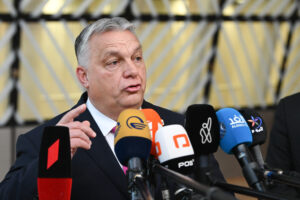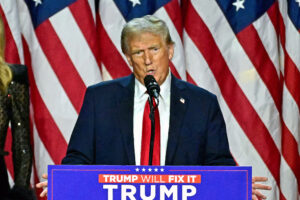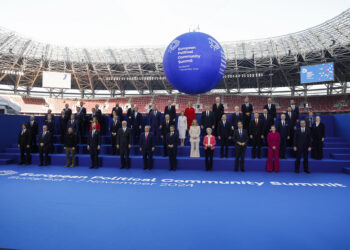Brussels – Now that Donald Trump has been re-elected to the White House, Europe is trying to predict its moves on one of the hottest international fronts, the war in Ukraine. While Brussels fears that military and financial support from the stars and stripes could drastically decrease or even stop, what worries Kyiv most is the (re)elected president’s promise to end the conflict “in 24 hours”. The Ukrainian head of state, Volodymyr Zelensky, is sending decidedly eloquent messages to his U.S. counterpart to prevent him from imposing on the former Soviet republic an accelerated peace process that risks turning into a “defeat.”
Zelensky and Budapest
After congratulating Trump over his victory in the polls, the Ukrainian president returned to the issue of Washington’s support for Kyiv’s war efforts yesterday (Nov. 7) at the fifth meeting of the European Political Community, hosted in Budapest by Hungarian Prime Minister Viktor Orbán. Speaking to reporters, he admitted that “President Trump really wants a quick decision” on how to end hostilities with Russia but added that “that doesn’t mean it will go that way.” Because, he insisted, “we all want this war to end, but with a just end“: if the peace process “is too fast, it will be a defeat for Ukraine,” he said flatly.
The host also appeared confident about the prospects for a diplomatic resolution of the conflict opened up by Trump’s return to the White House. “Those who want peace are growing in number,” declared Orbán, renewing his call for an immediate ceasefire. “The precondition for peace is communication,” the Magyar leader explained, and “the condition for communication is a ceasefire,” which “can provide margin and time for the parties to the conflict” to “start negotiating peace.”

The appeal was immediately branded as “dangerous” and “irresponsible” by Zelensky, who argued that a ceasefire at this time—that is, with about one-fifth of Ukrainian territory in the hands of Moscow’s forces, which are also advancing on the Donbas front—would amount to “destroying our independence and sovereignty.” “We already tried” to reach a ceasefire in 2014, the Ukrainian president recalled, “and we lost Crimea, and then we had the full-scale invasion in 2022.” As if to say that Vladimir Putin cannot be trusted because he is not interested in peace.
What is Trump’s idea of peace?
Trying to figure out the idea of “peace” that Trump would have in mind is, therefore, the central question the entire Ukrainian leadership is sweating about. For now, the president-elect has not publicly leaked any details on how he intends to resolve the crisis that has bedevilled the former Soviet republic for the past decade. Still, some journalistic indiscretions speak of different options on the table of the Republican leader.
And all of them, moving away from the approach followed by the Biden administration (i.e., to let Kyiv decide when to start negotiations), envisage Ukraine giving up part of its internationally recognized territory, i.e., that drawn by the 1991 borders. In some versions, these would be the regions militarily occupied by Moscow; in others, a kind of demilitarised buffer zone (on the model of the two Koreas) whose contours would have to be negotiated at the table and patrolled by international troops. Which, of course, would have to be European and not US: “We will not send American men and women to defend the peace in Ukraine,” said a member of Trump’s entourage, suggesting that “the Poles, Germans, British, and French” should do it.
Another recurring element would be the imposition of some form of neutrality on Kyiv, ironically called the “Finlandisation” of the former Soviet republic before Helsinki decided to join NATO shortly after the Russian invasion began. Also, according to these hypothetical plans, entry into the North Atlantic Alliance would be frozen at least temporarily for Ukraine, which would continue to receive Western weapons systems as a deterrent against any new aggression.

An additional, even more radical option proposed by some early Trump administration aides to force Kyiv to sit at the negotiating table would be stopping arms supplies to the Ukrainian resistance. This is the worst-case scenario for Zelensky and his people: not only would they enter the negotiations from a position of extreme weakness, but they would not even be able to contain further Russian attacks if Putin decides that he wants to annex a few more pieces of the former Soviet republic to the Federation before negotiations. In other words, it would be a matter of leaving carte blanche to the Kremlin.
Strategic Vision
For Kyiv, it is imperative to make it clear to Trump that supporting Ukraine is in Washington’s interest. On the one hand, any temporary solution to the conflict that is too beneficial to Russia risks sending Moscow the message that, in the end, it has won and, therefore, it can try again whenever it wants. This is what happened when, a decade ago, there were no major consequences for the unilateral annexation of Crimea and the stationing of troops in Donbas, two violations of Ukrainian sovereignty that set the stage for the full-scale war of 2022.
On the other hand, if parts of Ukraine definitively fall to Russia, Europe and the United States will lose access to the natural resources of the attacked country, as well as to the military assets that Kyiv has developed in two and a half years of war and that could be used for the security of the Old Continent in synergy with NATO forces.
This is, after all, the point of the “plan for victory” that Zelensky submitted to the leaders of the Twenty-Seven last month: net of the call for bringing Ukraine into the Alliance, the president put down in black and white what his country can offer in return for international help. To get the message across that Western investment is strategic and long-term and that giving in to Putin now would mean compromising the security of all of Europe.
Meanwhile, the EU is trying to run for cover as best it can. Just today (Nov. 8), the Council has extended another two years—until November 2026—the mandate of its military assistance mission to Ukraine (EUMAM Ukraine), endowing it with a budget of some €409 million. This is a symbolic message of support for Kyiv, but little more than peanuts when considering the scale of the expenses the resistance has to bear. As things stand, the Twenty-Seven would hardly be able to keep Ukraine afloat on their own should aid from the other side of the Atlantic fail.
English version by the Translation Service of Withub






